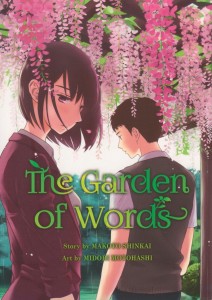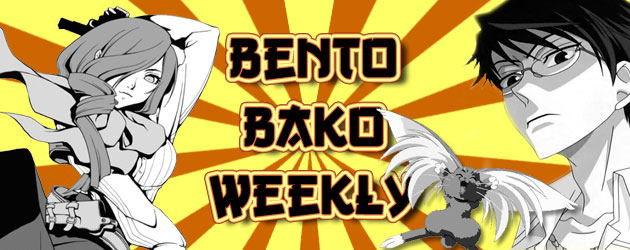 Title: The Garden of Words
Title: The Garden of Words
Author: Makoto Shinkai (story), Midori Motohashi (art)
Publisher: Vertical Comics
Volume: One volume, $12.95
Vintage: 2013 by Kodansha, 2014 by Vertical
Genre: Slice-of-life, drama
Akizuki likes to skip class on rainy mornings. He goes to a garden gazebo, where he sketches out designs for shoes. One day his solitude is interrupted by the presence of a woman. Before she leaves, she recites a poem about rain keeping someone from leaving. The poem resonates with him, and the next time it rains, he hurries back to the gazebo, hoping the woman will be there again. As the rainy season carries on, Akizuki and the mystery woman meet at the gazebo and gradually open up to each other. They share food and stories, Akizuki eventually telling the woman about his dream of designing shoes. Even the woman seems happy just to have some company, and she lends her support to Akizuki’s dream, encouraging him, and even offering to help him by letting him measure and sketch her feet. Each meeting becomes like a tiny world where only the two of them exist. Then the season changes, and the rain stops. Akizuki’s time fills up as he works toward his goal, taking on a summer job and visiting a local footwear college. Meanwhile, the woman finally makes the decision to officially quit her job and move away. When school starts up again, Akizuki finally learns the woman’s identity – Ms. Yukino, the former classic lit teacher. After asking his classmates, Akizuki learns that Yukino was driven out of her classroom by vicious rumors, gossip, and harassment from her students. A kind, thoughtful teacher, Yukino was friendly with her students, listened to their problems and encouraged them, and enjoyed her job. But when one girl’s boyfriend developed a crush on her, everything crumbled. The tide turned against her, her students bullied her, and eventually she couldn’t handle the harassment anymore and left. She did not officially quit, however, and briefly returns to the school to file the necessary paperwork to end her service at the school. Frustrated by what happened to Yukino, Akizuki tracks down the upperclassmen who were directly involved and confronts them. Later, after getting caught out in the rain, he ends up going to Yukino’s home, where he confesses his feelings.
I am ashamed to say that I have not seen Shinkai’s film version of this story. In fact, I’m behind by two films now. I’m almost certain that if I had seen the film, I would have enjoyed this manga more. There’s just something missing from it. The Shinkai touch. It’s still his story, but it’s missing the sweeping visuals and perfect scoring. And the emotion. Reading this is relaxing, certainly, but it lacks emotional depth. Normally a Shinkai film has me on the edge of my seat, and typically in tears at some point. This didn’t even come close, sadly. Though, to be fair, I don’t know if the movie would have a larger impact on me. All I know is the book didn’t have much of one. There’s a lot of emphasis on the poem spoken by Yukino, and it’s a nice bit of imagery. It’s also a good central motif for Yukino and Akizuki’s relationship. The rain brings them together, but even if it didn’t rain, they would willingly come together. The rest is sort of lazy (in a good way) and comforting. Well, not the bullying parts, obviously. That hits appropriately hard; kids can be really cruel. Though one of her former students lashes out about Yukino’s teaching skills (or lack of) in a negative manner, which leads me to think while she may have been a good friend to her students, she may not have been a very good teacher. That’s an odd thing to include, and doesn’t seem necessary. Unless it’s to highlight that she plain isn’t cut out for the job; that it’s not enough to just be kind and encouraging (although goodness knows kids could use more people like that in their lives). There’s one weird translation issue, too. Akizuki refers to Yukino as “Miss,” and to signify that she’s…something…she tells him to call her “Ms.” I think it’s meant to emphasize that she’s no longer a teacher (“Miss” being commonly used as an honorific for female (unmarried) teachers, with “Ms.” being more formal or business like), but it would be really useful to have a translation note here for what honorific is used in the original Japanese text. (Is he calling her “sensei”? And she’s asking him to call her Yukino-san instead?) Not a lot happens here, besides an examination of the relationship between two people, which is typical of Shinkai, and anyone familiar with his style will expect this. If you like that, check it out, because it is a pleasant read, and Vertical’s books always have a nice presentation, this one including a couple color pages in the front, and a pleasant cover design.
Kris
kristin@comicattack.net
@girlg33k_kris



